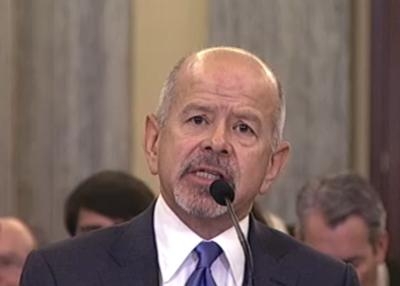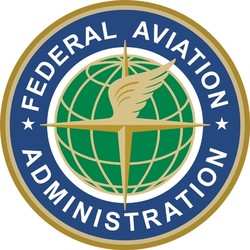Wed, Jun 17, 2015
Will Share Commercial Space Transportation Research And Development Activities
FAA Administrator Michael P. Huerta (pictured) and French National Space Agency (CNES) President Jean-Yves Le Gall have signed a Memorandum of Cooperation (MOC) to cooperate on research and development related to the safety of private sector orbital space launches and re-entry activities. The research-related, non-binding arrangement between France and the United States is the first of its kind covering research into commercial orbital space operations.

“This Memorandum of Cooperation will enhance domestically and internationally the quality, objectivity, and utility of methods designed to ensure the protection of public health and safety related to commercial space transportation,” said U.S. Secretary of Transportation Anthony Foxx. “Both France and the United States can achieve these goals through the exchange of information on programs and projects of mutual interest, carrying out joint analyses, and coordination of research activities relating to safety and the environment.”
The FAA Office of Commercial Space Transportation is in charge of regulating and overseeing the safety of the U.S. commercial space transportation industry. Today’s arrangement is strictly related to current activities that both the French and United States governments are involved with relating to orbital launches and spacecraft re-entries.
“This non-binding arrangement spells out our intentions to cooperate in research and development activities on the safety of commercial space launches and re-entries,” said Huerta. “The primary focus of this new partnership is to understand each other’s safety regulations and to evaluate safety techniques for the launch and/or re-entry of commercial space vehicles.”
Both Huerta and Le Gall pointed out that today’s Memorandum of Cooperation could pave the way for development of future arrangements between the FAA and France related to the regulation of suborbital reusable vehicles that can carry people and the operation of launch sites known as spaceports. The U.S. suborbital space industry has indicated potential human space flights may occur as early as 2016, and is currently evaluating locations outside the United States. For example, some private launch providers have expressed interest in conducting launches in Europe and the Caribbean. The FAA has the authority to license launches outside of the United States when the vehicles are operated by U.S. companies.

The FAA also has non-binding arrangements or exchanges of letters with Curacao, Italy, Spain, and the United Kingdom that covered FAA assistance with development of domestic regulations relating to commercial space transportation.
Since 1989, the FAA Office of Commercial Space Transportation has licensed more than 240 launches. Over the last several years, the FAA has been working with the private sector regarding the agency’s licensing and oversight of launches and re-entries involving spaceflight participants.
More News
Terminal Radar Service Area Airspace surrounding designated airports wherein ATC provides radar vectoring, sequencing, and separation on a full-time basis for all IFR and participa>[...]
Very High Frequency (VHF) The frequency band between 30 and 300 MHz. Portions of this band, 108 to 118 MHz, are used for certain NAVAIDs; 118 to 136 MHz are used for civil air/grou>[...]
“From approximately November 2021 through January 2022, Britton-Harr, acting on behalf of AeroVanti, entered into lease-purchase agreements for five Piaggio-manufactured airc>[...]
Also: Virtual FLRAA Prototype, IFR-Capable Autonomous A/C, NS-32 Crew, Golden Dome Missile Defense Bombardier announced that the first production Global 8000 successfully completed>[...]
Aero Linx: The 1-26 Association (Schweizer) The Association’s goal is to foster the helpfulness, the camaraderie, and the opportunity for head-to-head competition that is fou>[...]
 ANN's Daily Aero-Term (05.29.25): Terminal Radar Service Area
ANN's Daily Aero-Term (05.29.25): Terminal Radar Service Area ANN's Daily Aero-Term (05.30.25): Very High Frequency (VHF)
ANN's Daily Aero-Term (05.30.25): Very High Frequency (VHF) Aero-News: Quote of the Day (05.30.25)
Aero-News: Quote of the Day (05.30.25) Airborne 05.23.25: Global 8000, Qatar B747 Accepted, Aviation Merit Badge
Airborne 05.23.25: Global 8000, Qatar B747 Accepted, Aviation Merit Badge ANN's Daily Aero-Linx (05.30.25)
ANN's Daily Aero-Linx (05.30.25)




